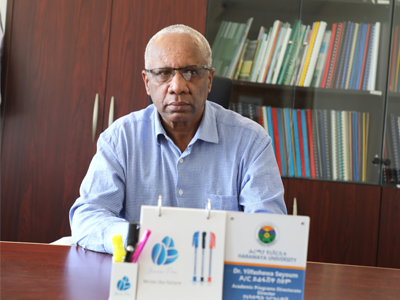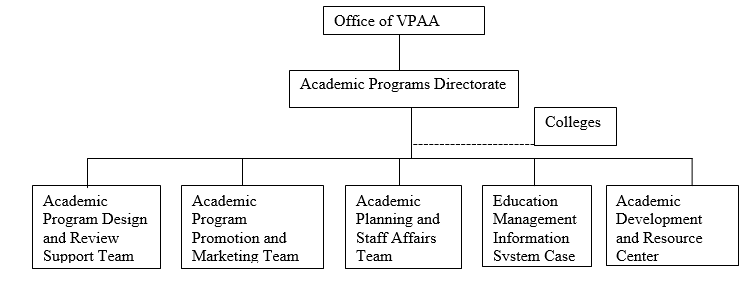About Academic Programs Directorate
Mission
The mission of the directorate is to develop demand driven and nationally as well as internationally recognized academic programs, and admit competent, inspired, and motivated prospective students.
Vision
Haramaya University strives to be one of the leading African Universities with international reputation by 2025. Based on this vision, the directorate has developed its own vision. The directorate aspires to be one of the leading to have academic programs that attract capable students nationally and internationally.
Director

Yilfashewa Seyoum (PhD)
Background
Through recalibration of the BPR, the Directorate of Academic Programs Development and Admission has been renamed as Academic Programs Directorate (APD) and all the human resource of the directorate are decided to be academic and technical staff. APD has been mandated with the following responsibilities:
• Accountable for the overall support of Program Development, Revision, Promotion and Marketing(PDRPM), and overall implementation as well as Academic Planning and Staff Affairs(APSA), Academic Development and Resource Center (ADRC), and Education Management Information System (EMIS)
• Develop and revise program development and/or review, promotion and marketing and EMIS Policies;
• Establish and coach a permanent PDRPM, APSA and Virtual Curriculum Teams, a Case Work, and Center Coordination,
• Organize national workshop for curriculum development or review;
• Monitor and evaluate the overall functioning of the teams and case worker of the directorate;
• Plan and report the activities and performances of the directorate;
• Support the VPAA with matters related to academic affairs; and
• Responsible for any other related activities in the academic affairs.
Academic Planning and Staff Affairs Team
Motto
Building the Basis for Development
Academic Programs Directorate Staff
Core Values:
Academic Programs Directorate Units
This team is responsible to:
- overall academic planning, reporting, staff promotion, scholarship, teaching evaluation and monitoring and support of program implementation;
- consolidate and organizes the plans and reports of the academic affairs prepared by deans and directors of learning-teaching core process;
- prepare and present the plan and report of the directorate separately, discusses with the directorate and includes to the main one;
- consolidate and organize the staff promotion request and presents to the director for APSC meeting; and
- follow up staff teaching performance evaluation, collects from colleges, analyzes it, gets signed by the director and provides feedback to the staff.
Education Management Information System (EMIS).
This section is responsible to:
- all education management information system of the university;
- collect all educational data and organizes them into data-base;
- analyze and synthesize all educational information and converts it into usable one;
- prepare educational information and provides it to concerned officials as per the information provision guidelines; and
- categorize information for reporting all the time indata-base.
Academic Planning and Staff Affairs Team
In the new reform, 3 team leaders, 1 coordinator and 1 case worker will coordinate the overall activities of Academic Programs Directorate. Explicitly, these are:
Program Design and Review Support Team (PDRST).
This team is responsible to:
- conduct assessments of the existing programs of the university and comes up with recommendations of program merging and splitting;
- check the fulfillment of policy requirements in developing/reviewing programs;
- conduct preliminary need assessment;
- undertake continuous curricula evaluation study;
- serve as a chairperson of curriculum Virtual Team (CVT);
- participate in and lead the curriculum development/review process;
- develop and present the draft curriculum on the National workshop;
- submit the final curriculum to APD for the final approval by the Senate; and
- upload the approved curriculum on the ISIS.
Academic Program Promotion and Marketing Team.
This team is responsible to:
- prepare all university programs for promotion and marketing;
- prepare comprehensive program brochures, flyers, and prospectus;
- prepare theme and/or script of advertisement;
- manage data-base for all programs and their websites; and
- upload program information on the website after approval of the APD.
Academic Development and Resource Center (ADRC).
This center is responsible to:
- design and run different training programs for the academic staff in order to develop their professional competencies;
- undertake high level researches in HU in the area of instructional methodologies to generate solutions for problems and pave ways for improvement;
- provide necessary consultancies to academic staff regarding ways of improving instructional skills;
- formulate module preparation guidelines; and
- develop checklists for module evaluation.
Academic Programs
Haramaya University (HU) has been working hard to expand and develop demand driven and nationally recognized academic programs. These academic programs are expected to produce competent graduates in diverse field of studies allied with the university vision and missions. In a regular mode, 74 undergraduate, 118 MA/MSc/MPH/MBA, 35 PhD, 7 specialty residence programs, and 3 postgraduate diploma/certificate training programs are underway in the main and satellite campuses of the university. Under the non-formal education mode, the university runs 29 summer, continuing and distance education undergraduate programs. Also, HU runs 49 postgraduate programs (MA/MSc/ MPH), through summer and continuing education programs. Overall,241 academic programs are available in non-regular manner.


